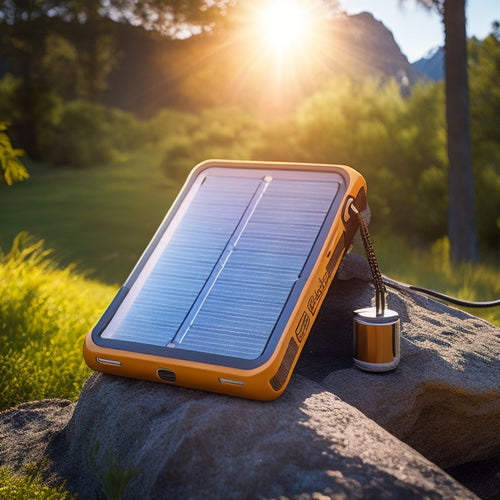
Solar Panel Kits for Home Diy
Share
You can greatly reduce your utility bills and carbon footprint by installing a solar panel kit for your home, with the right DIY approach. By switching to solar, you'll not only lower your energy costs but also contribute to a cleaner environment. To get the most out of your solar panel kit, evaluate high-efficiency panels, efficient charge controllers, and smart battery protection. Assess your roof's shading patterns and obstructions to optimize panel placement. With the right setup, you can achieve energy independence and maximize your energy production. Now, uncover the key factors to reflect on when selecting and installing the perfect solar panel kit for your home.
The Essentials
- DIY solar panel kits can significantly reduce energy costs and lead to substantial long-term savings with proper system sizing and maintenance.
- High-efficiency solar panels with advanced technology enhance energy output, and combining them with reliable energy storage systems ensures energy independence.
- Expert installation tips and efficient charge controllers with smart battery protection features optimize system performance and prevent battery damage.
- A well-designed system considers roof shading patterns, obstructions, and orientation to maximize energy production and reduces reliance on the grid.
- Government and utility company incentives, along with DIY installation, can offset initial investments and enhance overall savings.
Renewable Energy Saves Money
You'll see a significant reduction in energy costs when you switch to renewable energy, as solar panels capture free energy from the sun to power your home.
This translates to lower utility bills, which can add up to substantial savings over time.
With a well-designed home solar kit, you can address common issues such as high upfront costs and limited energy storage capabilities, and instead enjoy affordable options and integrated battery storage solutions.
Energy Cost Reduction
One of the most notable advantages of utilizing renewable energy through solar panel kits for home DIY is the substantial reduction in energy costs. By capturing the power of the sun, you can greatly decrease your reliance on traditional energy sources, leading to long-term savings.
Solar incentives and government rebates can also help offset the initial investment, making it even more financially appealing. With the convenience of DIY installation, you can avoid the hassle of hiring a professional and save even more off-grid systems.
Furthermore, Home Solar Panel Kits offer a user-friendly solution that fits your budget and schedule. Proper system sizing and installation tips are essential to maximize energy output and reduce costs.
With energy independence, you'll have greater control over your energy usage and expenditure. Regular maintenance strategies, such as DIY troubleshooting, can help guarantee your system operates at peak levels. Financing options are also available to make the shift to renewable energy more accessible.
In addition to the financial benefits, solar energy provides considerable environmental benefits, reducing your carbon footprint and contributing to a cleaner, healthier environment.
Lower Utility Bills
Lower Utility Bills (Renewable Energy Saves Money)
You're taking a significant step towards energy independence by investing in a solar panel kit for your home. One of the most attractive benefits of going solar is the potential to lower your utility bills. With solar power, you'll be generating your own clean energy, reducing your reliance on the grid, and slashing your electricity costs.
By embracing a cleaner, more sustainable future, you'll not only reduce your carbon footprint but also contribute to a healthier environment for future generations. The amount you save will depend on the size of your solar panel system, your energy usage, and the local electricity rates.
To maximize your savings, take advantage of solar incentives offered by the government and utility companies. These incentives can help offset the initial cost of your solar panel kit and installation.
Additionally, follow expert installation tips to guarantee your system is optimized for maximum energy production. By doing so, you'll be able to generate more power and reduce your energy bills even further.
With a well-designed and installed solar panel system, you can enjoy significant savings on your utility bills, giving you more freedom to allocate your resources as you see fit.
Zero Carbon Footprint Guaranteed
You're looking to reduce your energy expenses and eliminate your reliance on fossil fuels, and with a solar panel kit, you can do just that.
By utilizing the power of the sun, you'll greatly cut your energy bills and reduce your carbon footprint to zero.
With DIY solar systems, you can easily install and maintain your own renewable energy source, and with pre-assembled panels for simple installation, you'll be up and running in no time.
With a zero-carbon footprint guaranteed, you'll not only be saving money but also contributing to a cleaner, more sustainable environment.
Reduce Energy Expenses
Frequently, homeowners find themselves trapped in a cycle of rising energy bills, which can be a considerable burden on their wallets.
You're not alone in this struggle. By switching to solar power, you can break free from the shackles of costly energy expenses. With a solar panel kit for your home, you'll be able to utilize the abundant energy from the sun and convert it into electricity, greatly reducing your reliance on the grid.
This means you'll be enjoying lower energy bills, and in some cases, even earning credits from your utility company. Imagine having the freedom to allocate your hard-earned money towards more important things, like upgrading your home or investing in your future.
Solar power kits offer a pathway to energy independence, allowing you to take control of your energy needs and live a more sustainable lifestyle. By reducing your energy expenses, you'll not only be saving money but also contributing to a cleaner, greener environment.
Eliminate Fossil Fuels
By shifting to solar power, you're effectively severing your reliance on fossil fuels, an essential step towards a zero-carbon footprint. This change allows you to break free from the constraints of non-renewable energy sources and adopt a cleaner, more sustainable future.
Fossil fuels, which have long been the primary source of energy, are finite and contribute noticeably to greenhouse gas emissions. By utilizing the power of the sun, you're opting for a fossil fuel alternative that's abundant, clean, and virtually limitless.
As you begin this expedition, you'll be adopting sustainable energy solutions that not only benefit the environment but also your wallet.
Solar panel kits for home DIY installations make it easier than ever to tap into this renewable energy source. With the ability to generate your own electricity, you'll be reducing your reliance on the grid and enjoying greater energy independence.
Efficient Charge Controllers Included
You'll find that the efficient charge controllers included in these solar panel kits boast high efficiency ratings, ensuring that your system maximizes energy production.
They're designed to work seamlessly with deep cycle batteries, which are a popular choice for off grid battery systems, to provide a reliable energy storage solution.
They also feature smart battery protection, which safeguards your battery's health by preventing overcharging and undercharging.
With these advanced controllers, you can trust that your system is running at peak performance and your battery is protected from damage.
High Efficiency Ratings
Top-rated solar panel kits for home DIY projects boast high efficiency ratings, thanks to the inclusion of efficient charge controllers. You're able to utilize more power from the sun, reducing your reliance on the grid and your energy bills.
These high-efficiency ratings are made possible by advancements in solar technologies, which have led to significant improvements in panel performance. For instance, modern solar panels can convert up to 22% of sunlight into electrical energy, compared to earlier models that struggled to reach 15%.
When you're shopping for a solar panel kit, look for high-efficiency ratings, typically above 20%. This guarantees you're getting the most out of your investment.
Keep in mind that high-efficiency solar panels often come with a higher price tag. However, they'll provide more power per hour of sunlight, making them a worthwhile investment in the long run.
Smart Battery Protection
The solar panel kit's efficient charge controller guarantees smart battery protection, safeguarding your energy storage system from overcharging or undercharging. This confirms your batteries last longer, reducing the need for frequent replacements and saving you money in the long run. You'll enjoy extended battery longevity, thanks to the charge controller's ability to regulate the flow of energy to your batteries.
| Feature | Benefit |
|---|---|
| Overcharge Protection | Prevents damage to your batteries, confirming they last longer |
| Undercharge Protection | Confirms your batteries are always ready to provide power when you need it |
| System Compatibility | Works seamlessly with your solar panel kit, confirming efficient energy harvesting |
| Automatic Low-Voltage Disconnect | Disconnects the battery from the load when it reaches a low voltage, protecting it from damage |
With this smart battery protection, you can rest assured that your energy storage system is safe and efficient. You'll have the freedom to enjoy clean, renewable energy without worrying about battery damage or system incompatibility.
Assess Your Roof's Shading
You'll need to identify roof obstructions that can cast shade on your solar panels, such as chimneys, vents, and skylights.
Additionally, you should analyze shading patterns over time, taking into account factors like tree growth and seasonal changes.
When planning your DIY solar kit installation, it's crucial to evaluate residential solar kits that cater to your specific energy needs.
You may also want to assess your roof's structural integrity to verify it can support the weight of the solar panels.
Roof Obstructions to Consider
When evaluating your roof's shading, look out for obstructions that can cast a shadow on your solar panels, reducing their energy output. These obstructions can be vent pipes, skylights, or chimneys, which can create shade on specific areas of your roof.
Take note of their location and size to determine how they'll affect your solar panel installation.
Consider the roof angles as well. If your roof has multiple angles, it may be more challenging to install solar panels. You might need to use specialized mounting hardware or adjust the panel's tilt to accommodate the roof's unique shape. This can increase the installation cost and complexity.
Additionally, installation challenges can arise from obstructions like roof vents, antennas, or satellite dishes. These can make it difficult to secure the solar panels or may require additional hardware to work around them.
Be sure to identify these potential issues early on to guarantee a successful and efficient DIY solar panel installation.
Shading Patterns Over Time
Shading patterns on your roof change throughout the day and year, depending on the sun's position. As you assess your roof's shading, consider the seasonal variations that affect the amount of sunlight your solar panels will receive.
During the winter months, the sun is lower in the sky, resulting in longer shadows and more shading. In contrast, the summer months bring longer days and more direct sunlight.
Conduct a shading analysis to identify the areas of your roof that receive the most sunlight throughout the year. This will help you determine the most suitable locations for your solar panels.
Consider the orientation of your roof, as well as any obstructions such as trees, chimneys, or neighboring buildings that may cast shadows. By understanding the shading patterns on your roof, you can optimize the placement of your solar panels to maximize energy production and achieve energy independence.
A thorough shading analysis will help you make informed decisions about your solar panel installation, ensuring you get the most out of your DIY solar panel kit.
Higher Energy Conversion Rate
You'll want to prioritize efficient energy harvesting to maximize your solar panel kit's performance.
This means selecting high-efficiency solar panels that can convert a higher percentage of sunlight into usable electricity.
Efficient Energy Harvesting
Efficient energy harvesting is critical to getting the most out of your solar panel kit, and it starts with a higher energy conversion rate. You want to maximize the amount of energy your solar panels produce, and that's where advanced solar technology comes in.
By using high-efficiency solar cells, you can increase the energy output of your system. This means you'll generate more power per hour of sunlight, reducing your reliance on the grid and increasing your energy independence.
To take full advantage of efficient energy harvesting, you'll also need a dependable energy storage system. This allows you to store excess energy generated during the day for use at night or during power outages.
A well-designed energy storage system guarantees that you can tap into your stored energy when you need it most. By combining advanced solar technology with a sturdy energy storage system, you'll be able to utilize the full potential of your solar panel kit and enjoy the freedom that comes with generating your own clean energy.
Frequently Asked Questions
Can I Install Solar Panels on a Metal or Clay Tile Roof?
You can install solar panels on metal or clay tile roofs, but be prepared to address unique installation challenges, such as securing panels to roof types with specific fastening systems, ensuring watertight seals, and accommodating thermal expansion.
Are Solar Panel Kits Compatible With Existing Electrical Systems?
You're likely aware that 70% of homes can accommodate solar panels. To guarantee a seamless integration, you'll need to assess your existing electrical system's compatibility with the solar panel kit's system requirements, securing a smooth installation that meets your energy freedom goals.
How Long Does It Take to Install a Solar Panel Kit?
When you tackle a DIY solar panel installation, you'll spend around 2-5 days on setup, depending on the kit's complexity and your skill; follow DIY tips for efficient installation, and prioritize a safe, precise process to guarantee a successful outcome.
Do Solar Panels Work During Power Outages or at Night?
You're wondering if solar panels work during power outages or at night. The answer lies in power storage and inverter function: with a battery backup, you can store excess energy generated during the day for use during outages or at night.
Are Solar Panel Kits Resistant to Extreme Weather Conditions?
You're right to wonder about weather durability; solar panels are designed to withstand extreme conditions, including hail, high winds, and heavy snow loads, ensuring your energy independence isn't compromised by Mother Nature's fury.
Final Thoughts
You've made it! You're now a certified DIY solar panel expert, ready to utilize the power of the sun and stick it to the man (aka your utility company). With your newfound knowledge, you'll be saving money and saving the planet in no time. Just remember, a zero-carbon footprint is just a few panels away. So, get installing and bask in the glory of your eco-friendly awesomeness.
Related Posts
-

Top Eco-Friendly Camping Equipment for a Sustainable Adventure
When you're camping with the planet in mind, opt for eco-friendly gear like tents made from recycled materials and bi...
-

How to Achieve a Zero-Waste Lifestyle for a Greener Tomorrow
To achieve a zero-waste lifestyle, start by adopting the principles of refusing, reducing, reusing, and recycling. Sw...
-

Fastest Solar Chargers for Emergency Power
When choosing the fastest solar chargers for emergency power, you need to focus on features like rapid charging capab...


